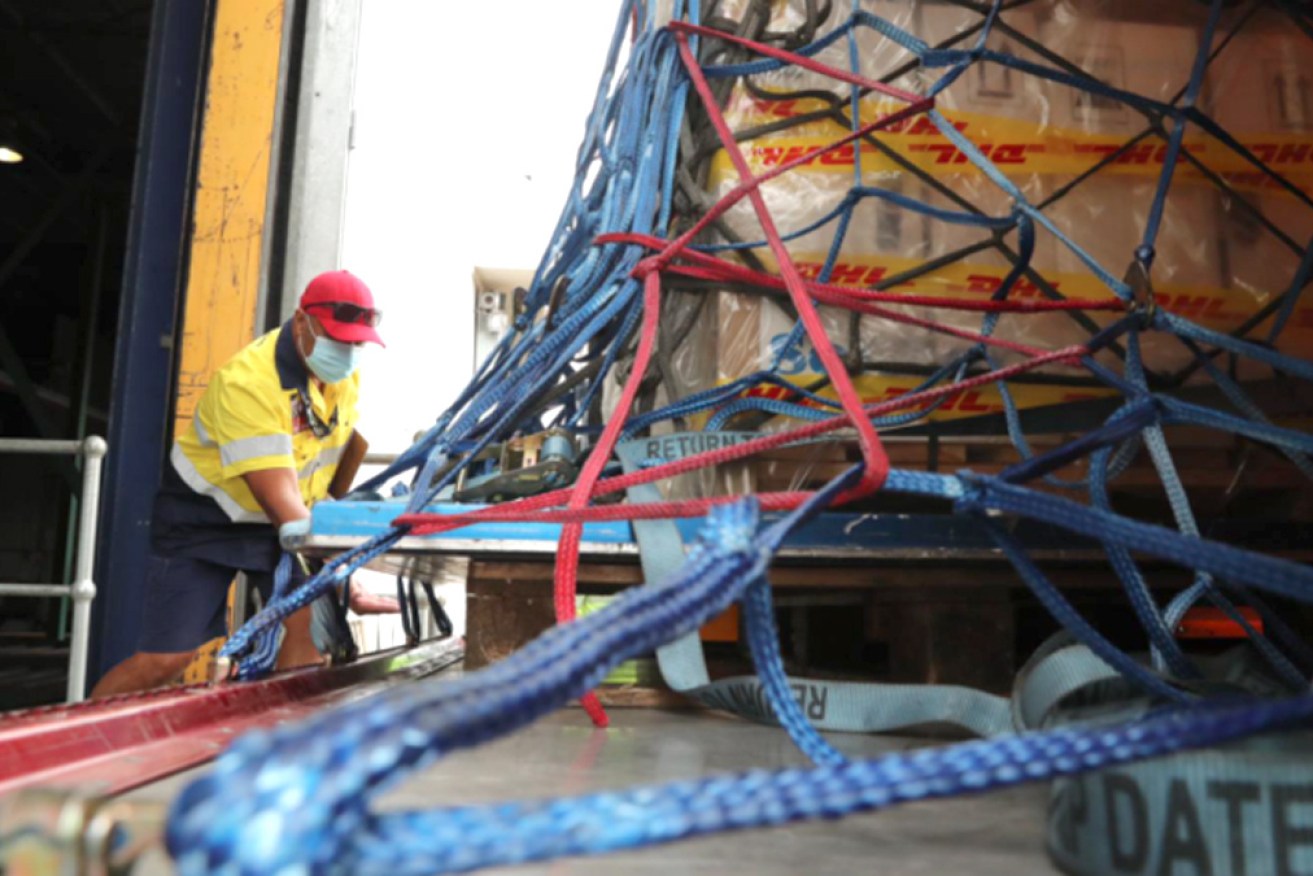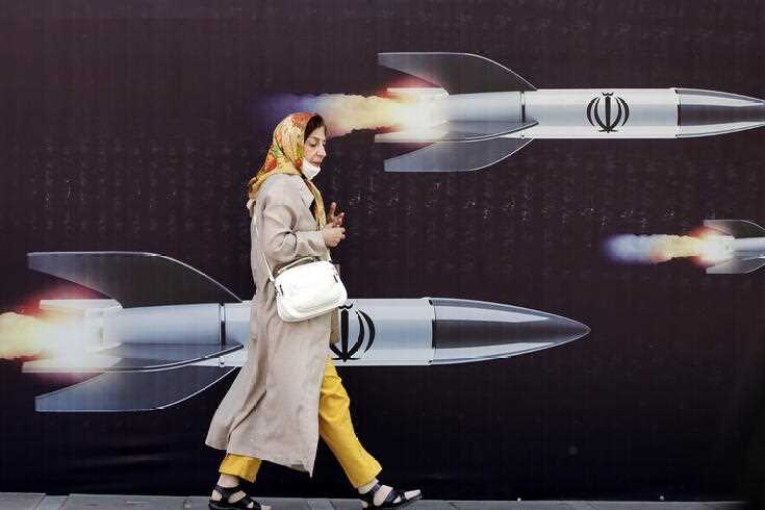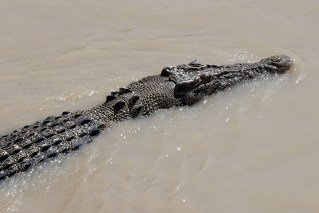‘The eagle has landed’: First Pfizer doses arrive, jabs to begin February 22


The first Pfizer shipment has arrived in Australia. Photo: Supplied
The nation’s first COVID vaccine doses could be in Australian arms within days, with a larger-than-expected first shipment of Pfizer jabs touching down in Sydney on Monday.
Health Minister Greg Hunt said the government was on track to meet its ambitious goal of four million vaccinations by early April, despite Australia starting its inoculation program months after the US, Britain and European Union.
“The eagle has landed,” a grinning Mr Hunt said within minutes of the flight carrying the vaccines touching down on Monday.
Vaccinations will start on February 22.
The vaccine has landed and we’re stepping up our fight against the pandemic. More than 142,000 doses of the Pfizer/BioNTech vaccine have just arrived at Sydney Airport in a major milestone in Australia’s response to #COVID19. Read more: https://t.co/aNZt99BfJk
— Scott Morrison (@ScoMo30) February 15, 2021
The federal government had expected “at least” 80,000 doses of the Pfizer vaccine to arrive by the end of the week. On Monday afternoon, 142,000 doses landed on a Singapore Airlines flight from Belgium.
Some 80,000 doses will be administered next week, to begin the long-awaited rollout of Phase 1a of the federal vaccine roadmap.
The Pfizer jab requires two doses, given 21 days apart. About 60,000 of Australia’s first shipment will be held back, for second doses to be administered later.
Vaccine vials will be inspected for several days as part of ‘batch testing’, before being inoculations can start.
Mr Hunt said there would be a “specific focus” on vaccinating quarantine and border workers in the opening weeks – a plan that comes after recent virus leaks from hotel quarantine in Sydney, Adelaide, Brisbane, Perth and Melbourne.

Greg Hunt says vaccinations will begin next week. Photo: AAP
“It will be a mix in the first week of rural and urban, every state, every territory, and further details will be made available later this week as we have confirmed the ability of individual facilities to be ready next week,” he said.
Some 50,000 of the first doses will be distributed to state governments, for “for hotel quarantine and border workers and frontline healthcare workers”. The other 30,000 will go to staff and residents in aged care and disability care.
“It is expected that of these, at least 60,000 will be administered by the end of February, with others to be continually administered thereafter,” Mr Hunt and Prime Minister Scott Morrison said in a statement.
Australia is now on track for the first & most vulnerable Australians to start receiving the Pfizer #COVID19 vaccine from 22 Feb.
More than 142,000 doses of the vaccine have arrived in Australia, the 1st shipment of 20m doses the Govt has secured.
Moreℹ️https://t.co/aFDC9pgEOn pic.twitter.com/efvY3Erq41
— Josh Frydenberg (@JoshFrydenberg) February 15, 2021
However, Mr Hunt said he wasn’t able to confirm when Australia’s next shipment of Pfizer would arrive, or how many doses it would include.
Australia has purchased 20 million doses, with Pfizer confirming only that they will arrive by the end of the year. Mr Hunt said the government hoped three million in total would arrive progressively by June.
The federal government has come under heavy pressure to speed up the timetable to begin vaccinations, with not one Australian yet receiving a jab. By contrast, tens of millions of doses have been given across the US, Britain, EU, China, Russia, South America, the Middle East and Canada.
Labor has called for a faster rollout. Shadow health minister Mark Butler claimed “critical details remain utterly unclear.”
“We are now in the second half of February and still not a single Australian has received a single dose of COVID-19 vaccine. Around the world figures indicate that more than 170 million people have already received their vaccine,” he said on Monday.
They said we were at the "front of the queue". So why are Australians still waiting? pic.twitter.com/yXLIQ4Eoyh
— Anthony Albanese (@AlboMP) February 15, 2021
Mr Hunt also announced the first vials of the AstraZeneca vaccine, manufactured at Melbourne’s CSL facility, would come off production lines on Monday. Chief medical officer Professor Paul Kelly, speaking with the minister in Parliament House on Monday, said a Therapeutic Goods Administration decision on the AstraZeneca vaccine – of which Australia has contracts to import and manufacture 54 million doses – was expected in coming days.

Australia’s vaccine roadmap. Photo: Department of Health
“That should see a doubling of the number of doses per week by early March, if not earlier,” Mr Hunt said, adding that two million CSL-made doses would be available by the end of March.
The government initially set a goal of vaccinating four million people by the end of March. That timeline was shifted to early April amid production and shipping delays in Europe.
Mr Hunt said he still believed that to be an achievable timeline, with hopes of giving four million people at least their first dose by that time.
“We remain on track, under the latest advice, for all of the milestones that we have set,” he said.
Mr Hunt and Mr Morrison said that 60,000 Pfizer doses, from Monday’s initial shipment of 142,000, would be held for second doses.
“In lessons learnt in rollouts around the world and on the advice of experts, approximately 60,000 vaccines will be provisioned to ensure consistent supply and sufficient stock for second doses. The second dose of the vaccine will be administered at 21 days after the first dose,” they said.
It's a great day today. The first 142,000 doses of the #covid19 #PfizerVaccine have arrived here in Australia.https://t.co/axydXPg9eW#vaccineswork #vaccinationnation
— Dr. Nick Coatsworth (@nick_coatsworth) February 15, 2021
Former deputy chief medical officer Dr Nick Coatsworth called it “a great day”.
In a statement, Singapore Airlines said the journey from Brussels had taken 40 hours.
“Together with DHL Global Forwarding, Singapore Airlines ensured the precious cargo was given priority loading,” a spokesperson said.
“The vaccines were also monitored throughout their journey, including during their transit in Singapore, to ensure there were no disruptions to the cold chain requirements.”








